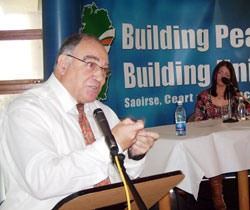18 January 2007 Edition
See the opportunities - Seize the moment

Ronnie Kasrils, South Africa’s Minister for Intelligence
BY JIM GIBNEY
“The old order is dying and the new order is struggling to be born.” That was the assessment of Ronnie Kasrils, South Africa’s Minister for Intelligence, of the present state of the peace process in this country.
The former Intelligence Officer for Umkhonto we Sizwe (MK), the ANC’s army, was speaking last Sunday at the annual meeting of an Cúige Uladh.
Kasrils is well-placed to make such an assessment, given the central role he played in the struggle to end apartheid and to replace South Africa’s white racist regime with a democratic government.
In an unscripted address which lasted 50 minutes, he situated the struggle against apartheid in the context of 300 years of resistance to white colonial rule.
Drawing off the ANC’s negotiating strategy, he advised republicans, “Don’t be paralysed by the actions of your political opponents, by your own expectations of struggle. See the opportunities. Seize the moment.”
Kasrils illustrated the need for decisive action with an example from Alice in Wonderland. “Alice tumbles through the mirror to a strange land. She is confused, arrives at a crossroads and doesn’t know which road to take. She asks a caterpillar which road should she walk. The caterpillar asks her, where do you want to go? Alice says she doesn’t know. Well then, said the caterpillar, any road will do.”
In the 1990s, ‘any road will do’ was not in the ANC’s strategic dictionary. Neither is it in Sinn Féin’s.
Negotiations for the ANC were the dynamic that replaced their armed struggle. Their decisions provided momentum to propel the situation forward.
At a time when black people were powerless, MK’s armed actions gave them great hope and lifted their morale. After the suspension of the armed struggle, this hope was sustained through visible progress such as the release of political prisoners, the unbanning of the ANC and the Communist Party, and the ANC’s organisation of black people across South Africa.
It was not all plain sailing. Negotiations broke down many times. The ANC had to find a way around many roadblocks of one kind or another, usually set up by the securocrats.
In their desperation to hold onto power, the racists plunged blacks into an internecine war in which 20,000 died.
But the ANC faced whatever challenges came at them, absorbed them and turned them to their advantage. They took many initiatives and made many compromises with their opponents. They were, after all, trying to create a nation of one people where none had existed before.
Trust yourselves; trust those leaders tested in struggle, said Ronnie.
Inside the room in Tí Chulainn, it was easy to see the comparisons between the peace processes here and in South Africa.
Those listening to Ronnie Kasrils will be asked to blend his words with their own experience in the next few weeks.
On 28 January, Gerry Adams will ask them to back another initiative to break the impasse.
I am convinced that they will take the next big step on our long and torturous journey towards independence and reunification.
